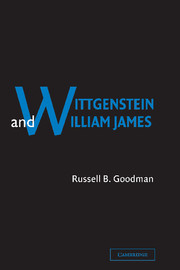Book contents
- Frontmatter
- Contents
- Preface
- Abbreviations
- Introduction
- 1 Varieties of Pragmatic Experience
- 2 Wittgenstein and The Varieties of Religious Experience
- 3 Wittgenstein and The Principles of Psychology: An Introduction
- 4 What Is It Like to Be a Human Being?
- 5 Language and Meaning
- 6 Pragmatism Reconsidered
- Coda
- Notes
- Index
4 - What Is It Like to Be a Human Being?
Published online by Cambridge University Press: 23 July 2009
- Frontmatter
- Contents
- Preface
- Abbreviations
- Introduction
- 1 Varieties of Pragmatic Experience
- 2 Wittgenstein and The Varieties of Religious Experience
- 3 Wittgenstein and The Principles of Psychology: An Introduction
- 4 What Is It Like to Be a Human Being?
- 5 Language and Meaning
- 6 Pragmatism Reconsidered
- Coda
- Notes
- Index
Summary
“Are you not really a behaviorist in disguise? Aren't you at bottom really saying that everything except human behavior is a fiction?” – If I do speak of a fiction, then it is of a grammatical fiction
(PI, 307).As befits the empiricist he claims to be in The Principles of Psychology, James offers an account of the self based on experience; and in accord with his own particular slant in psychology, he thinks of the relevant experience as predominantly introspective. Like Hume, James doubts our ability to introspect anything we can call the central self. Yet he is drawn, mistakenly, as Wittgenstein sees it, into the claim that he experiences this self “in the head or between the head and throat” (PP, 288). Nevertheless, James's chapter “The Consciousness of Self,” provides a richly detailed account of the human self – of what it is like to be a human being, to use Thomas Nagel's memorable and useful phrase. Wittgenstein engages parts of this chapter explicitly in Philosophical Investigations and in typescripts and lectures of the late 1940s. As always, James comes in for criticism for confusing logical or grammatical connections with empirical ones, and for seeking answers to logical questions through empirical inquiry. Wittgenstein joins James, however, in countering traditional, more or less Cartesian, views of the self – according to which the self occupies a domain entirely separated from the body.
- Type
- Chapter
- Information
- Wittgenstein and William James , pp. 89 - 118Publisher: Cambridge University PressPrint publication year: 2002



